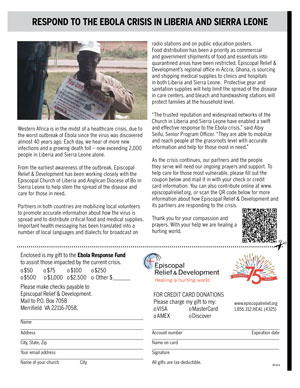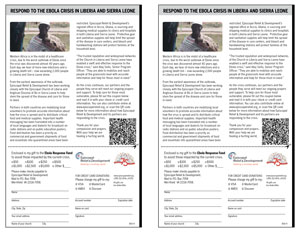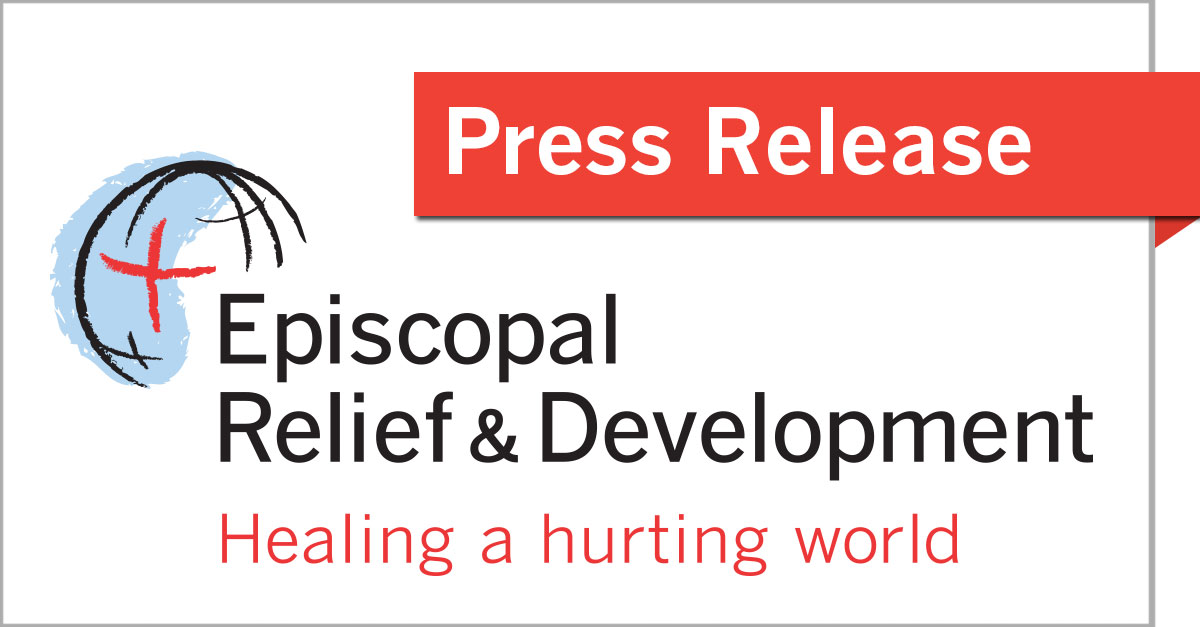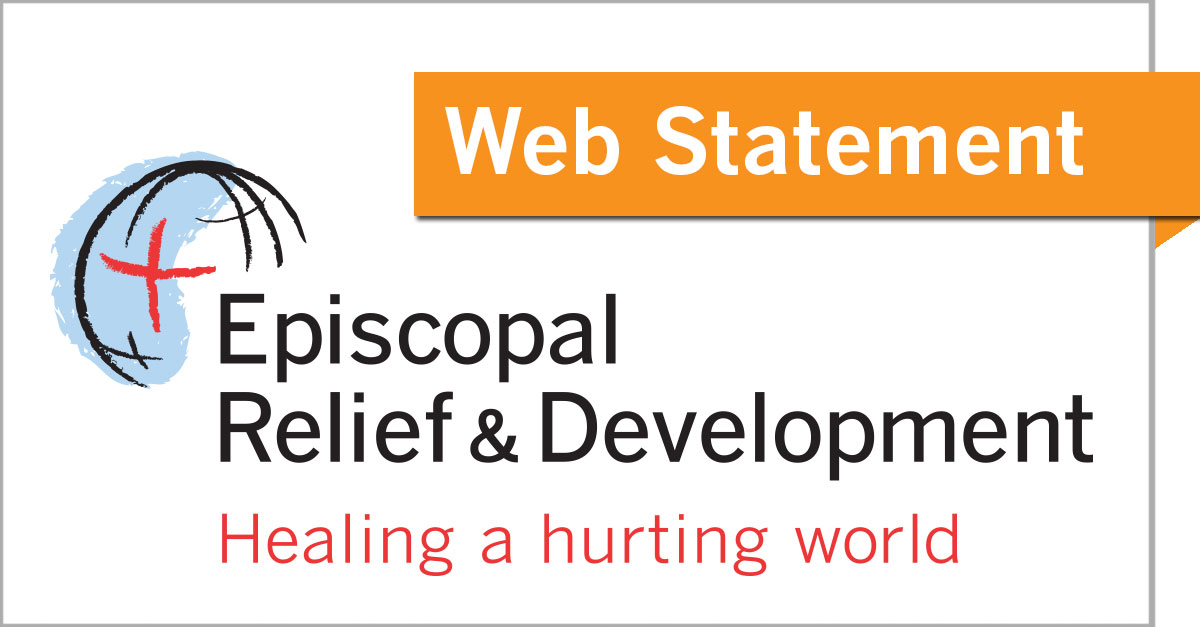Responding to Ebola Crisis in Sierra Leone and Liberia
Episcopal Relief & Development is working with the Anglican Diocese of Bo in Sierra Leone and the Episcopal Church of Liberia in response to the Ebola epidemic that has killed hundreds of people since the current outbreak began in March 2014. Through its local partners, the organization is supporting awareness-raising efforts and providing food supplies in addition to personal protection equipment and disinfectants to under-resourced hospitals and clinics in the affected areas.
Updates
- 11/20: Presiding Bishop Calls for Prayer
- 10/29: Blog Post Reflects on Earth Institute Conference on Ebola
- 9/24: FAQ Sheet, Bulletin Inserts, Blog Post
- 8/27: Local Churches Empower Communities with Knowledge and Equipment to Stop Ebola Spread (Photos)
- 8/27: Wider Episcopal Response to Ebola Crisis
- 8/27: Facebook Photo Album: Mobilization and Distribution
- 8/21: Supporting Liberian Church’s Ebola Response: Food, Supplies and Prevention Awareness
- 8/14: Increasing Support to Church of Liberia
- 8/6: Responding through Church in Liberia and Sierra Leone
Sign up to receive press releases and web updates
Read full statement from The Episcopal Church
“Presiding Bishop Katharine Jefferts Schori has urged Episcopalians to observe the Second Sunday in Advent, December 7, as a day of prayer for those in the Diocese of Liberia and the entire Anglican Church of the Province of West Africa, areas heavily affected by the current Ebola pandemic.
“‘The Diocese of Liberia was founded by Episcopalians in 1836, and was a diocese of The Episcopal Church until the early 1980s, when it joined the Province of West Africa,’ noted Presiding Bishop Jefferts Schori. ‘Today we continue in a covenant relationship of mutual support and fellowship.’”
Episcopal Relief & Development Program Officer Vanessa Pizer attended the “Ebola Crisis: What it Means for West Africa and the World” conference held by Columbia University’s Earth Institute on Wednesday, October 27. On the organization’s blog, Pizer reflects on the conference and presents compelling stories from panelists that illustrate why targeting poverty is necessary in order to reduce the spread and impact of infectious diseases like Ebola.
Episcopal Relief & Development has posted a Frequently Asked Questions document about the Ebola crisis and the organization’s response through local Church partners in Liberia and Sierra Leone.
Additionally, bulletin inserts are now available for congregations wishing to raise awareness about the crisis and support the response through the Ebola Response Fund.
On the Episcopal Relief & Development blog, Senior Program Officer Abiy Seifu writes about how the Church’s long-term presence and dedicated work in communities now impacted by Ebola enables it to mobilize existing networks and program teams to handle the current crisis, and positions it to assist during the post-Ebola recovery phases.
In Liberia and Sierra Leone, Episcopal Relief & Development’s local Church partners are leveraging their widespread presence and trusted reputation to alleviate suffering and contain the Ebola outbreak that has killed 1,427 people in West Africa since March 2014.
Partners in both countries are mobilizing local volunteers to promote accurate information about Ebola and distribute hygiene and sanitation supplies. In addition, the Church in Liberia is supplying food parcels for households in quarantined communities and providing basic protective equipment for health workers at local hospitals.
“The situation is extremely dire, due both to the severity of the disease and the difficulty in containing it,” said Abiy Seifu, Senior Program Officer for Episcopal Relief & Development. “People want to care for sick family members at home, they are afraid to go to the clinics because so many are dying and there is a great deal of misinformation about how Ebola is spread. Fear about the disease is making the outbreak worse, and we are aiming to combat this fear with accurate information and support for basic needs.”
Local development staff of the Episcopal Church of Liberia are working with government health staff in Bong County to distribute food items such as rice, cooking oil and canned meat to 500 people in four quarantined rural communities. Volunteers are delivering food and sanitation supplies to homes, and demonstrating correct mixing procedures for different concentrations of bleach water for hand-washing and cleaning. The supplies also include a hand-washing station made by installing a spigot in a covered five-gallon bucket, and a poster with accurate information about how to prevent Ebola and what to do if a family member presents symptoms of the disease.
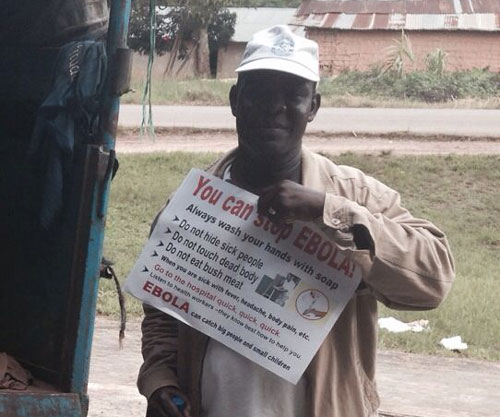
Text of health messaging poster being distributed in Liberia: You can stop EBOLA! Always wash your hands with soap
EBOLA can catch big people and small children |
Efforts in Liberia also include radio messaging in local dialects through 15 stations in nine counties and the distribution of bumper stickers with key messaging to churches of other denominations.
The shipment of facemasks, gloves, gowns and other protective supplies from Episcopal Relief & Development’s Africa Regional Office in Ghana arrived in Liberia and were given to three area hospitals – Phebe Hospital, Redemption Hospital and C.H. Rennie Hospital – in a commissioning ceremony by The Most Rev. Jonathan B.B. Hart on August 26.
In Sierra Leone, the Anglican Diocese of Bo is actively participating in the government District Health and Development Team’s planning and implementation process for Ebola control, specifically on detection and case management. Diocesan staff trained local health volunteers who had already been active in the Church’s malaria and HIV prevention efforts to assist with education, case identification and contact tracing. The volunteers also distributed hand-washing stations.
Contact tracing is one of the most important but often most difficult aspects of disease control, especially because the incubation period between when a person contracts Ebola and when they show symptoms can range from two to 21 days. Trusted local volunteers who are familiar with community members and their relationships and daily routines can be extremely helpful, both in identifying cases and contacts, and in encouraging their neighbors to follow the correct procedure when someone is sick or has died, in order to prevent further infection.
“Some of the biggest challenges in stopping Ebola come from hiding sick people and treating them at home rather than seeking isolation and medical assistance, patients escaping quarantine and burial practices that do not contain the disease. Culturally appropriate messaging and case management are essential in encouraging communities to adopt behaviors that will effectively combat Ebola,” Seifu said.
Episcopal Relief & Development is currently in conversation with both the Church of Liberia and the Diocese of Bo in Sierra Leone regarding expansion of activities to reach remote communities and longer-term engagement to address the growing food crisis. Restrictions on transportation and commerce due to quarantine are already causing shortages, but there may be a longer-term impact on livelihoods and food supply due to lack of market access and missed planting seasons. In addition, families whose main breadwinner has fallen ill or died are particularly vulnerable.
“One of the key strengths of our Church partners is that people know them and they can access areas that might be difficult for other organizations or even the government to reach,” said Seifu. “I am very glad that the local government agencies have recognized this strength and that they can pool resources and expertise to implement a unified strategy. This partnership is important now and will continue to be as the region recovers from this disaster.”
Donations in support of Episcopal Relief & Development’s response to the current Ebola outbreak in West Africa may be designated to the Ebola Crisis Response Fund.
Episcopal Relief & Development is the international relief and development agency of The Episcopal Church and an independent 501(c)(3) organization. The agency takes its mandate from Jesus’ words found in Matthew 25. Its programs work towards achieving the Millennium Development Goals. Episcopal Relief & Development works closely with worldwide Church and ecumenical partners to help rebuild after disasters and to empower local communities to find lasting solutions that fight poverty, hunger and disease, including HIV/AIDS and malaria.
Cuttington University, an Episcopal institution in Liberia with its main campus in Bong County, has felt the effects of Ebola deeply. Cuttington graduates make up a large proportion of Liberia’s healthcare workforce, and a number of the health workers who have contracted Ebola while caring for sick patients are alumni. In order to keep students and staff safe, and to help prevent the spread of the virus in the surrounding community, Cuttington reports that it has installed hand-washing stations throughout campus and launched a prevention education campaign. In addition, the university is assisting the Bong County Ebola Task Force by donating fuel for emergency vehicles, along with food from the university farm and sanitation supplies for rural communities. Outreach teams also provide prevention education as well as psychosocial care.
Episcopal Relief & Development and the Episcopal Church of Liberia are mobilizing an awareness-raising campaign about Ebola prevention and treatment through church leaders and local volunteers in five counties. The Church is also providing food supplies for health workers and quarantined patients through emergency response centers such as Phebe Hospital in Bong County.
In addition, Episcopal Relief & Development’s Africa Regional Office in Ghana has procured and shipped protective supplies to aid the Liberian Church’s response to the deadly epidemic.
“We sent disposable masks, gowns and gloves in addition to eye protection, which will give health workers some degree of safety,” said Vanessa Pizer, Program Officer for Episcopal Relief & Development. “However, Ebola is highly contagious and these are just the most basic measures. What is really needed are grassroots campaigns to advance accurate information about Ebola, so people can protect themselves and respond compassionately but effectively when they know someone is sick.”
Working through local priests, the Church is disseminating accurate information in nine dialects through fifteen radio stations. Church of Liberia staff have also created flyers in local dialects with clear explanations and instructions around Ebola prevention and response. Volunteers will distribute the flyers and post them in churches and community buildings to reach as many people as possible.
Food relief is another critical aspect of the Church’s response. Travel restrictions, quarantines and fears of spreading Ebola through commerce have led to shortages of food and higher prices for basic goods. The Church’s development office is procuring food items in-country and transporting them to the most severely affected regions, and distributing supplies through hospitals and relief centers.
According to the World Health Organization, as of August 20, 1,350 people have died from Ebola in West Africa. Liberia has been hardest-hit, with 576 recorded deaths since the outbreak began in March 2014. The current Ebola epidemic is the worst since the virus was discovered in 1976, in the Democratic Republic of Congo, then called Zaire.
Due to shortages of medical supplies in Liberia, the Episcopal Relief & Development’s Africa Regional Office in Ghana purchased supplies in Accra and sent them via airfreight to Monrovia. The shipment was met by Church staff, who will accompany the supplies to their destinations and facilitate distribution in cooperation with local volunteers and Ebola Task Force members.
The first distributions of informational flyers and medical supplies will take place in Robertsport and Benejah cities in Cape Mount, with additional distributions in Grand Gedeh, Bong, Lofa and Rivercess.
In correspondence with Episcopal News Service, the Most Rev. Jonathan B.B. Hart, Archbishop of Liberia, stated that people are struggling with conflicting desires to care for their sick family members and prepare the bodies of those who have died with the necessity of not coming in contact with the bodily fluids through which Ebola, a hemorrhagic virus, spreads.
He said that he and other clergy and government leaders are urging people to set up hand-washing stations and to wash their hands frequently in chlorine-treated water.
“Because of the Church’s widespread presence in Liberia and its dedicated clergy and volunteer networks, they and Episcopal Relief & Development are very well positioned to promote accurate information and access areas that are hard to reach otherwise,” Pizer said. “I am grateful to our partners there, who are putting themselves in harm’s way to try and save lives, and encourage prayers of support for them and the communities they are ministering to.”
Donations in support of Episcopal Relief & Development’s response to the current Ebola outbreak in West Africa may be designated to the Ebola Crisis Response Fund.
Episcopal Relief & Development is the international relief and development agency of The Episcopal Church and an independent 501(c)(3) organization. The agency takes its mandate from Jesus’ words found in Matthew 25. Its programs work towards achieving the Millennium Development Goals. Episcopal Relief & Development works closely with worldwide Church and ecumenical partners to help rebuild after disasters and to empower local communities to find lasting solutions that fight poverty, hunger and disease, including HIV/AIDS and malaria.
Episcopal Relief & Development has increased its support for the response efforts of the Episcopal Church of Liberia to the worsening Ebola outbreak.
Additional funds will enable the Church to continue promoting accurate information via local radio, including facts about Ebola prevention and recommendations for how to treat sick people and the deceased. The support will also enable the Church to deliver increased food and medical supplies to hospitals and local Ebola Task Forces in four counties: Grand Cape Mount, Bong, Lofa and Rivercess.
In Bong County, Phebe Hospital – affiliated with Cuttington University, an Episcopal insitution – is providing medical care and food to approximately 500 people in quarantine near its facility. Without sufficient supplies of protective equipment, health workers are at risk, and seven staff have already died from Ebola. However, the hospital remains the best equipped institution in the area to deal with the outbreak and serve as a center for humanitarian response.
Travel, and therefore all trade, is restricted between counties in order to minimize the spread of the disease. However, the Church is able to obtain special travel permits to deliver urgently-needed food items and protective and sanitation supplies to a drop point, where hospital staff and local leaders can retrieve them.
According to the World Health Organization on August 14, “The outbreak of Ebola virus disease in West Africa continues to escalate, with 1975 cases and 1069 deaths reported from Guinea, Liberia, Nigeria and Sierra Leone.”
Escalating fear and movement restrictions have led to extreme scarcity of basic supplies and services across the affected counties, causing additional illness and death. The country’s healthcare system has been overwhelmed by increased need and shortages of staff and resources, so common illnesses such as malaria are going untreated. Malnutrition due to lack of food is a growing concern, especially as deaths erode family structures and leave children and the elderly even more vulnerable.
Please continue to pray for the Church of Liberia as it ministers to its community in crisis, for all those affected directly or indirectly by the disease and especially for health workers and volunteers who are putting themselves at risk to contain and mitigate the effects of the outbreak.
|
A Prayer for First Responders Blessed are you, Lord, God of mercy, who through your Son gave us a marvelous example of charity and the great commandment of love for one another. Send down your blessings on these your servants, who so generously devote themselves to helping others. Grant them courage when they are afraid, wisdom when they must make quick decisions, strength when they are weary, and compassion in all their work. When the alarm sounds and they are called to aid both friend and stranger, let them faithfully serve you in their neighbor. We ask this through Christ our Lord. Amen. — Adapted from the Book of Blessings, #587, by Diana Macalintal |
To enable Episcopal Relief & Development to respond to crises like the current Ebola crisis in West Africa, please donate to the Ebola Crisis Response Fund.
Episcopal Relief & Development is working with the Anglican Diocese of Bo in Sierra Leone and the Episcopal Church of Liberia in response to the Ebola epidemic that has killed hundreds of people since the current outbreak began in March 2014. Through its local partners, the organization is supporting awareness-raising efforts and providing personal protection equipment and disinfectants to under-resourced hospitals and clinics in the affected areas.
“The disease caused by the Ebola virus is extremely serious and contagious,” said Abiy Seifu, Senior Program Officer for Episcopal Relief & Development. “I am grateful that our partners in Sierra Leone and Liberia have acted quickly and made responding to this crisis a top priority.”
The current Ebola outbreak began in Guinea around the capital, Conakry, and four southeastern provinces bordering Sierra Leone and Liberia. By mid-April, neighboring countries were reporting suspected cases, with confirmed cases in late May and increased spread through June and July.
Ebola is a virus that causes hemorrhagic fever, which is often fatal. In the current crisis, as of August 1, 887 out of 1603 suspected cases (56%) have resulted in death. There is no vaccine or established cure.
Containing the virus has been a challenge due to the ease with which Ebola spreads (through contact with bodily fluids of infected individuals or eating meat from infected animals) and the long latent period of up to three weeks between infection and the appearance of symptoms.
Additionally, the high death rate and lack of successful treatment has led to popular reluctance to seek professional diagnosis or hospital care. For this reason, or due to misconceptions about the cause of the disease, many families are choosing to treat the illness at home. This causes further spread and makes accurate assessment of the numbers and locations of cases and deaths difficult.
In response, The Episcopal Diocese of Bo in Sierra Leone is building on its existing health programs to reach key community leaders such as priests, imams, traditional healers and chiefs with training on how to promote accurate information and encourage correct prevention and treatment practices.
“Faith leaders are respected and listened to by their communities and can therefore play an important role,” Seifu said. “They can help head or promote education and awareness-raising campaigns to promote change in high-risk behaviors.”
The diocese is also mobilizing its network of local health volunteers to reach children and youth in schools, and to directly reach 20,000 individuals through community meetings and home visits. Health volunteers also assist international health organizations and Sierra Leone’s Ministry of Health and Sanitation in watching for and referring suspected cases.
In Liberia, Episcopal Relief & Development is assisting the local Church in providing necessary medical and sanitation supplies to hospitals and clinics. These supplies include bleach for sanitizing health facilities, and disposable gloves and hand sanitizer to help protect health workers who may come into contact with infected patients.
“Health workers, volunteers and others who are at the forefront in combating this deadly disease are increasingly contracting the Ebola virus themselves,” said Seifu. “Prayers and support are needed as these people do their utmost to tend to their patients in these extremely challenging circumstances.”
To enable Episcopal Relief & Development to respond to crises like the current Ebola crisis in West Africa, please donate to the Ebola Crisis Response Fund.
Episcopal Relief & Development is the international relief and development agency of The Episcopal Church and an independent 501(c)(3) organization. The agency takes its mandate from Jesus’ words found in Matthew 25. Its programs work towards achieving the Millennium Development Goals. Episcopal Relief & Development works closely with worldwide Church and ecumenical partners to help rebuild after disasters and to empower local communities to find lasting solutions that fight poverty, hunger and disease, including HIV/AIDS and malaria.

